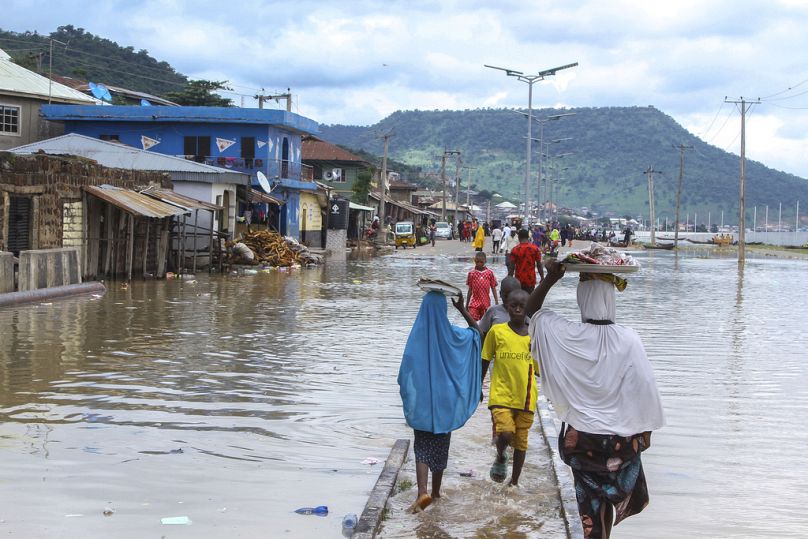Loss and damage might end up in the dustbin of failed climate efforts — and with it, any hope of the support much of the world needs to contend with climate change and keep our planet within 1.5 degrees, Nik Nazmi bin Nik Ahmad writes.
My nation, Malaysia, is among those on the frontlines of climate change. But today I write not only as a representative of Malaysia but also as a voice for countless others across the Global South who find themselves in a similar predicament.
That’s because just two weeks ago, one of the most important climate meetings since COP27 took place — one that could potentially derail the most important COP Summit to date.
The Fourth Transnational Committee on Loss and Damage in Egypt ended in a deadlock over how the Loss and Damage Fund would work.
Malaysia itself supported the decision at COP27 to make the operationalisation of the fund a permanent agenda item at COP28, especially given the incredible potential the fund has to transform how vulnerable nations adapt to climate change.
Unfortunately, last week, the US and other wealthy nations proposed the World Bank oversee the implementation of the Fund, which — rightfully — ignited a firestorm of outrage among the G77 nations.
After all, the US-headquartered World Bank is renowned for being sluggishly slow in responding to climate-related crises and natural disasters.
But there’s also an undeniably political dimension lurking beneath this proposal.
Establishing a fund under the World Bank's purview, whose presidents are appointed directly by the US, would grant donor countries disproportionate sway over the fund and could potentially mean exorbitant fees for recipient nations.
It also enables Western nations to shirk their responsibility towards meaningful climate financing — allowing them to conveniently pass the buck to an institution with a track record of delays and inadequacies.
Eyes of the world on the West?
The understandable frustration towards developed Western nations was apparent even in COP President Dr Sultan Al Jaber’s comments when he reminded committee members, that the “eyes of the world” were on them.
In his words, “billions of people, lives and livelihoods who are vulnerable to the effects of climate change, depend upon the successful delivery” of appropriate measures.
A follow-up pre-COP meeting has been scheduled for this Friday. That meeting may well be the global community’s last opportunity to agree on crucial details for loss and damage — one that if not capitalised upon, would fracture the global cooperation and foundation necessary to meet the crucial 1.5-degree target the world depends upon.
This is why the Loss and Damage Fund is too important to become a tool of political influence.
What this week’s follow-up meeting should be discussing is how to actualise an independent body, operating under international law, to oversee the Loss and Damage fund.
This body should include the implementation of The Santiago Network, which facilitates technical assistance to address loss and damage, especially in vulnerable developing countries.
Such an arrangement would grant Global South nations the autonomy to access vital funds swiftly and without the uncertainties associated with the World Bank.
Not allowing access to the Loss and Damage Fund could cause further damage
Yes, critics argue wealthy nations should control these funds on the basis of vulnerability criteria, but that is a flawed approach.
Middle-income countries, like Malaysia and Bangladesh, are far from immune to climate-related catastrophes.
Excluding us from access to the Loss and Damage Fund threatens to create divisions within the Global South.
Instead, we should be directed by the Common But Differentiated Responsibility and Respective Capability (CBDR-RC) rule which states that all countries should tackle climate change, wealthier industrialised nations that have contributed most to global emissions (and also profited most) carry a heavier financial burden.
After all, my nation alone needs hundreds of billions of euros over the next 50 years to confront the climate crisis. And developing nations overall will need trillions.
As such, the Loss and Damage Fund is a lifeline that should not be subject to the whims and bureaucracy of distant institutions.
The dustbin of failed climate efforts
There is, however, real hope that we can reverse course. This COP presidency has tabled one of the most pro-climate financing agendas to date.
According to an analysis by Turkey’s Üsküdar University, COP28 aims to fulfil all previous COP financing commitments, including doubling adaptation finance by 2025, securing the $100 billion (€93.9bn) already pledged, and reforming the international financial architecture to unlock further trillions of low-cost investments.
Ultimately, we must operate not within existing archaic and politically compromised structures but be bold enough to create entirely new structures capable of meeting the unprecedented needs of vulnerable nations struggling against climate change.
This is why the COP Presidency’s support of the Bridgetown Initiative calling for a more inclusive and equitable global financial system is so promising.
This would mean reforming the Bretton Woods institutions, creating a new global development bank, and establishing an entirely new global financial transaction tax.
But for it to become reality requires the support of industrialised Western nations and a radical departure from the norm.
The survival of our planet calls for it. The alternative? Loss and damage might end up in the dustbin of failed climate efforts — and with it, any hope of the support much of the world needs to contend with climate change and keep our planet within 1.5 degrees.
Nik Nazmi bin Nik Ahmad serves as the Minister of Natural Resources, Environment and Climate Change of Malaysia. He is a Member of Parliament for Setiawangsa.
At Euronews, we believe all views matter. Contact us at view@euronews.com to send pitches or submissions and be part of the conversation.













